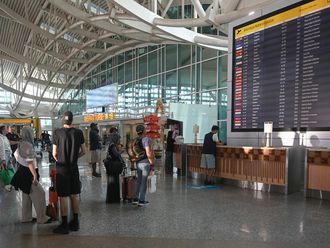London: Nato is not ready to deal with a military attack by Russia on a member state and must adjust to the unconventional tactics seen in Ukraine, British lawmakers warned on Thursday.
The conflict in eastern Ukraine was a “wake-up call” for the 28-nation alliance, which had become complacent, Britain’s parliamentary defence committee said in a report.
It said Nato had failed to adapt to Moscow’s increasing use of “ambiguous warfare”, such as cyber attacks and local militias backed by Russian special forces.
The report also urged the alliance to station troops permanently in Baltic member nations Estonia, Latvia and Lithuania, saying they were particularly vulnerable.
“The risk of attack by Russia on a Nato member state, whilst still small, is significant. We are not convinced that Nato is ready for this threat,” said committee chairman Rory Stewart.
“Nato has been too complacent about the threat from Russia, and it is not well-prepared,” added Stewart, a former soldier and diplomat in Afghanistan, Iraq and the Balkans.
Nato — which is due to hold a summit in Wales in September — said it would study the report.
The warning comes after the EU and US imposed their toughest sanctions on Russia since the Cold War, accusing Moscow of failing to defuse the conflict in eastern Ukraine and failing to help with access to the site of downed Malaysia Airlines flight MH17.
Western nations say Russian-backed separatists in Ukraine’s troubled east likely shot down the plane with a missile.
The British report said Nato was “currently not well-prepared for a Russian threat against a Nato member state”.
“A Russian unconventional attack, using asymmetric tactics — the latest term for this is ‘ambiguous warfare’ — designed to slip below Nato’s response threshold, would be particularly difficult to counter.
“Events in Ukraine this year, following on from the cyber attack on Estonia in 2007 and the invasion of Georgia by Russia in 2008, are a ‘wake-up call’ for Nato. They have revealed alarming deficiencies in the state of Nato preparedness, which will be tough to fix.”
The report recommended that the use of cyber-attacks and irregular militias should be included under Nato’s founding principle, Article 5, under which all members are bound to aid any member which is attacked.
The British government should use the September Nato summit to drive changes to deal with a threat from Russia, the committee added.
“The Nato alliance has not considered Russia as an adversary or a potential territorial threat to its member states for 20 years,” said the report. “It is now forced to do so as a result of Russia’s recent actions.”
Stewart said the transatlantic alliance had to expand from its current focus on terror and failed states to deal with a Russian threat using a different set of tactics to the Cold War.
“The instability in Russia, president Putin’s worldview, and the failure of the West to respond actively in Ukraine means that we now have to address urgently the possibility — however small — of Russia repeating such tactics elsewhere.”
Nato spokeswoman Oana Lungescu said the alliance would discuss a plan of action for Russia at the September summit.
“We have not seen the report by the UK Defence Select Committee but we’ll study it carefully once it’s published,” she said.
“Nato has already taken measures to reinforce collective defence, especially for our Eastern allies, with more planes in the air, more ships at sea, and more exercises on the ground.”












